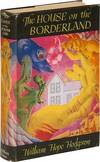
Tiny illuminated leaf from a medieval lady's Book of Hours. France, c.1475.
by Book of Hours
- Used
- Condition
- See description
- Seller
-
Golden Square, Victoria, Australia
Payment Methods Accepted
About This Item
Verso:14 lines of text in Latin written on vellum in an accomplished rounded gothic bookhand, Ruled in red and rubrics in red. One two-line illuminated initial 'T' in liquid gold on a red ground outlined in black. Extending from the initial into the margin are green tendrils bearing leaves and coloured flowers.
Recto: 14 lines of text.
Origin: France.
Date: c.1475.
Content:The text is from the Office for the Dead, Matins, First Nocturne. The rubric 'v' on the fourth line indicates the versicle:
Quem visurus sum ego ipse, et non alius, et oculi mei conspecturi sunt. Et in carne mea videbo Deum salvatorem meum.
(Whom I myself shall see and not another, and mine eyes shall behold. And in my flesh I shall see God my saviour.)
Then the illuminated initial 'T' begins the second lesson, from Job 10:
Taedet animam meam vitae meae, dimittam adversum me eloquium meum. Loquar in amaritudine animae meae: Dicam Deo, noli me condemnare. Indica mihi, cur me ita iudices. Numquid bonum tibi videtur, si calumnieris, et opprimas me, opus manuum tuarum, et consilium impiorum adiuves? Numquid oculi carnei tibi sunt: aut, sicut videt homo, et tu videbis?
(My soul is weary of my life, I will let my speech pass against myself. I will speak in the bitterness of my soul: I will say to God condemn me not. Shew me why thou judgest me so? Doth it seem good to thee, if thou calumniate me, and oppress me, the work of thy hands, and help the counsel of the impious? Hast thou eyes of flesh: or as a man seeth, shalt thou also see?)
Condition: The leaf is in excellent conditionI. It is unconditionally guaranteed genuine.
Size: Leaf: approx. 90x65 mm.
Notes: The extremely small size of this leaf can be explained thus: Medieval piety involved substantial elements of public display, and the small but emergent urban bourgeoisie, mostly merchants or administrators in the growing royal bureaucracies were intent on imitating their superiors. So the Book of Hours became something of a chic devotional accessory, especially for women, an incongruity that occasionally attracted disapproving comment. Eustache Deschamps, the great French poet of the late 14th century, put his satire into verse when he imagined the thoughts of a bourgeois lady who yearns for a Book of Hours that "is as graceful and gorgeous as me... So the people will gasp when I use it, That's the prettiest prayer-book in town."
The Office of the Dead (its old name was Office for the Dead) was in the back of every Book of Hours the way death itself was always at the back of the medieval mind. While the name may conjure images of grief and decay, in fact praying The Office was an act of love. It was the cause of considerable anguish for medieval men and women to think of the potentially long periods of time their relatives would spend in the painful fires of purgatory. Along with the funding of funerary Masses, praying the Office was considered the most efficacious means of reducing this fiery price of obtaining paradise. These aids were essential, because only the living could help the dead. The Office of the Dead includes a moving series of readings from the Old Testament Book of Job - as on this leaf. The trials endured by Job become an allegory for one's time on earth, or one's relatives in purgatory.
Reviews
(Log in or Create an Account first!)
Details
- Seller
- Littera Scripta
(AU)
- Seller's Inventory #
- MBH198
- Title
- Tiny illuminated leaf from a medieval lady's Book of Hours. France, c.1475.
- Author
- Book of Hours
- Format/Binding
- None
- Book Condition
- Used
- Quantity Available
- 1
- Place of Publication
- France
- Date Published
- 1475
- Weight
- 0.00 lbs
- Keywords
- manuscript,hours,leaf,scribe,gothic,medieval,leaf,script,saint,catholic,latin,text,vellum,decoration,initial,gold,flower
Terms of Sale
Littera Scripta
About the Seller
Littera Scripta
About Littera Scripta
Glossary
Some terminology that may be used in this description includes:
Also Recommended
-

Save 10% on every purchase!
Join the Bibliophiles’ Club and start saving 10% on every book.
$29.95 / Year









